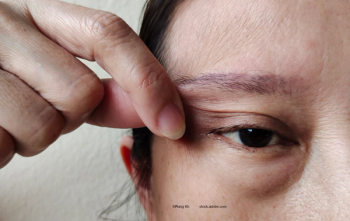
Causes of involutional ptosis
The development of involutional ptosis may be a multifactorial process, researchers have found.
Researchers led by Liza Cohen, MD, from the Division of Orbital and Ophthalmic Plastic Surgery, Stein Eye Institute, Doheny Eye Institute, Los Angeles, reported that development of involutional ptosis may be a multifactorial process.
The investigators conducted a case-control, observational cohort study1 in which they assessed systemic medical conditions and types of ocular surgery and the risk prevalence of ptosis in adult patients.
Data were drawn from a 10-year period from the electronic medical records of 5 academic medical centers.
Patients were included in the study based on their International Classification of Disease codes 9 and 10 for involutional ptosis; systemic comorbidities were also determined based on these codes.
The patients were matched by age and gender with controls from the general population.
Risk factors for ptosis identified
A total of 8,297 adult patients with involutional blepharoptosis and 13,128 matched controls comprised the study cohort (average age, 65 years).
The investigators reported that the 3 significant risk factors for developing ptosis were ocular surgery, hyperthyroidism, and type II diabetes (odds ratios, 4.2, 2.5, and 1.45, respectively; p< 0.05).
“Strabismus, corneal, and glaucoma surgeries were more highly associated with developing ptosis (p < 0.05).
Strabismus surgery had the greatest odds ratio of 3.37, followed by corneal surgery with an odds ratio of 2.31 and glaucoma surgery with an odds ratio of 1.56,” they said.
“Involutional ptosis is likely a multifactorial process. This study demonstrated that risk factors for the development of ptosis include ocular surgery, specifically strabismus, corneal, and glaucoma surgery, and hyperthyroidism and type II diabetes,” the team concluded.
--
Reference
1. Cohen LM, Campbell BC, Esfandiari M, et al. Ophthalmic surgeries and systemic medical conditions associated with the development of involutional ptosis. Ophthalmic Plast Reconstr Surg 2021;37:133-7; doi: 10.1097/IOP.0000000000001707
Newsletter
Don’t miss out—get Ophthalmology Times updates on the latest clinical advancements and expert interviews, straight to your inbox.





























